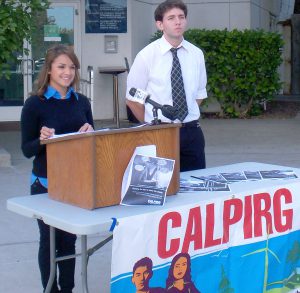New report finds that community college students work too many hours at the expense of academic success

Community College students could graduate faster and with better grades if they spent less time working at their jobs and more time studying and taking classes, according to a new report released today by the public interest group CALPIRG. Community college students surveyed reported working an average of 23 hours per week to cover college costs, leaving them without enough time to focus on academics. At the same time, many community college students had basic misunderstandings about financial aid, and the less they understood the less likely they were to have applied for aid. These factors likely contribute to low graduation rates – only 24% of community college students who intend to earn an associates’ degree or transfer to a four-year institution succeed in doing so within six years.
“Higher Education is the key to a successful future,” said Dorin Smith while reading a statement sent by California State Assembly Member Martin Block. “Community Colleges are a wonderful pathway to educational success – just ask the 2.5 million students that are taking classes at any of our state’s 72 campuses. We can’t afford for community college students not to succeed.” Enrollment at the states’ 110 colleges is already close to three million, and with many unemployed and underemployed workers seeking retraining and fee hikes making four-year schools less affordable, community college enrollment is likely to continue to rise.
“People think community colleges are cheap” said Genevieve Lopez, “but fees are only about 5% of the total cost of attendance, and so most students have no choice but to work long hours to get through school.” Less than one-quarter of students surveyed felt that they were able to balance work and study well. Many survey respondents felt that their work hours made it difficult for them to keep up with their schoolwork. Others felt their employment commitments kept them from taking another class, or being more involved on campus.
When asked three basic questions about financial aid, only ten percent of survey respondents were able to answer all correctly. Those who knew the least about financial aid were also the least likely to have applied for it. The report recommends that financial aid offices work to clear up basic misunderstandings and help students fill out the FAFSA and receive all of the aid for which they are eligible.
But improving outreach materials and increasing application rates is only part of the solution: “We need to increase our investment in higher education and fund state financial aid programs adequately, so that students can afford to focus on academics,” said Lopez. “Of course we are in a recession – but if we don’t fund higher education now we’re just undermining our own future success as a state.”